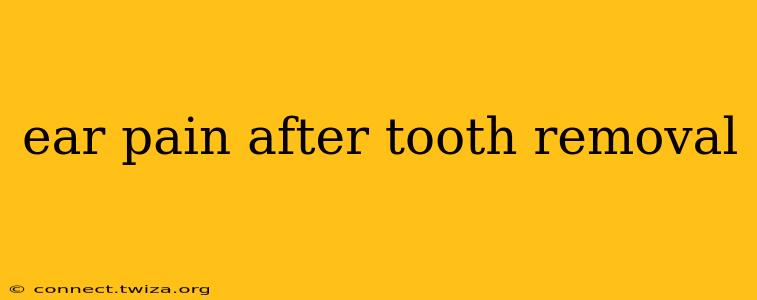Experiencing ear pain after a tooth extraction is more common than you might think. While it might seem unusual, the proximity of your teeth to your ears and the intricate network of nerves and blood vessels in your head and face explain this connection. Understanding the causes, effective treatments, and preventive measures can help alleviate discomfort and promote faster healing.
Why Does My Ear Hurt After a Tooth Extraction?
This is a frequently asked question, and the answer isn't always straightforward. Several factors can contribute to ear pain following tooth removal:
- Referred Pain: This is the most common reason. Nerves in your jaw and teeth are interconnected. Pain originating from the extraction site can be felt in your ear, a phenomenon known as referred pain. The brain misinterprets the pain signal, leading you to believe the ear is the source.
- Inflammatory Response: The extraction site undergoes inflammation as part of the healing process. This swelling can put pressure on nearby nerves and structures, including those connected to the ear.
- Sinus Infection (Less Common): The proximity of your upper teeth to your sinuses means an infection post-extraction could spread to the sinuses, causing pain that radiates to the ear. This is less common but should be considered if other symptoms arise.
- Dry Socket (Alveolar Osteitis): A dry socket occurs when the blood clot at the extraction site dislodges prematurely, exposing the bone. This can cause significant pain, potentially radiating to the ear.
- Underlying Conditions: Pre-existing ear conditions could be exacerbated by the stress of surgery. If you have chronic ear problems, you should inform your dentist before the procedure.
What Can I Do to Relieve Ear Pain After Tooth Extraction?
Managing ear pain after tooth extraction involves a combination of over-the-counter medications and self-care measures:
- Over-the-Counter Pain Relief: Nonsteroidal anti-inflammatory drugs (NSAIDs) like ibuprofen or naproxen can help reduce both pain and inflammation. Always follow the dosage instructions on the packaging. Acetaminophen (paracetamol) can also help manage pain.
- Ice Packs: Applying ice packs to the cheek near the extraction site can reduce swelling and numb the area, easing both jaw and ear pain. Apply ice for 15-20 minutes at a time, several times a day.
- Rest: Allowing your body to rest promotes healing and reduces pain. Avoid strenuous activities in the days following the extraction.
- Gentle Cleaning: Keep the extraction site clean by gently rinsing your mouth with salt water. This helps prevent infection. Avoid forceful rinsing or spitting.
How Long Will the Ear Pain Last?
The duration of ear pain varies depending on the individual and the complexity of the extraction. In most cases, the pain subsides within a few days to a week. However, persistent or worsening pain warrants a visit to your dentist or oral surgeon.
When Should I See a Dentist?
Contact your dentist or oral surgeon immediately if:
- Your ear pain is severe or worsening.
- You have signs of infection (fever, increased swelling, pus).
- You notice significant bleeding.
- Your ear pain is accompanied by other concerning symptoms.
Can I Prevent Ear Pain After Tooth Extraction?
While you can't guarantee the absence of ear pain, following your dentist's post-operative instructions diligently can significantly reduce your risk:
- Follow Post-Operative Instructions Carefully: Your dentist will provide specific instructions tailored to your procedure. Adhering to these instructions is crucial for minimizing complications and pain.
- Avoid Smoking: Smoking impairs healing and increases the risk of dry socket.
- Maintain Good Oral Hygiene: Continue brushing and flossing your teeth gently, avoiding the extraction site.
Is Ear Pain After Tooth Extraction Normal?
Yes, ear pain after a tooth extraction is a relatively common experience, often due to referred pain from the extraction site. However, it's important to monitor the pain and seek professional help if it becomes severe, persistent, or accompanied by other symptoms.
By understanding the causes, treatment options, and preventative measures, you can better manage any discomfort and ensure a smooth recovery after your tooth extraction. Remember, consulting your dentist or oral surgeon is crucial for addressing any concerns or complications.
